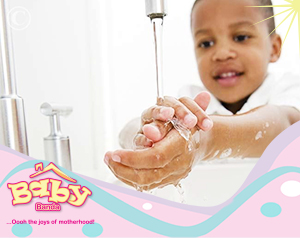The holidays are here again and those little munchkins get to enjoy the outdoors, play with all the mud, or splash about in the rainwater. It is important to teach your little ones to wash their hands regularly to protect them from germs that may cause infections.
The best way to stop the spread of infections is by hand washing. Most common infections are spread by hand and research suggests that washing hands at least five times a day has been shown to significantly decrease the frequency of colds, flu, and other infections.
Caregivers that take care of the kids should wash their hands:
- Before preparing any food or drink for the baby.
- Before feeding the baby.
- After using the washroom.
- Before and after changing the baby’s diaper.
- After wiping the baby’s nose.
- After handling any meats.
- After general cleaning.
- After handling any garbage.
- After handling any household pets or animals.
Teach your child to get the culture of washing their hands from an early age. They should wash their hands:
- Before eating any food.
- After using the washroom.
- After coughing or blowing the nose with a tissue.
- After playing outside in the soil or sand.
- After playing with toys.
- After playing with household pets like cats and dogs.
How to Wash Your Hands
- Use regular soap that does not contain antibacterial agents as regular soap will not kill the good bacteria that live on the hands.
- Regular soap will remove the dirt and grease that attract bad bacteria.
- Using antibacterial products unnecessarily increases the concentration of antibiotics in the water supply and in the environment.
- Rub your hands together with soap for 20 seconds and rinse your hands for 10 seconds
- If water and soap are not available, alcohol-based hand rubs are quick to use.
- Ensure that the product is at least 60% alcohol to be effective by checking the label.
- These products don’t clean the hands and are not a substitute for handwashing.
- Ensure that your child does not put the hands in the mouth until the alcohol evaporates.













